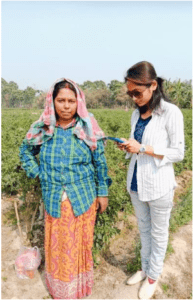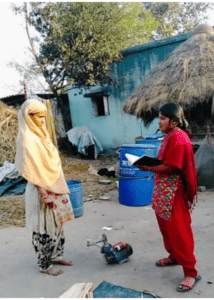

Reclaimed Water for Edible Crop Irrigation in India
July 13, 2023
The Crawford Fund’s highly sought after Student Awards are one way we support and encourage the next generation of Australians into study, careers and volunteering in international agricultural research.
Overseas travel for our 2020 awardees’ was dramatically impacted by the global pandemic but with some ingenuity many, including Sophie Lountain from the University of South Australia, developed wraparound experiences, and here’s Sophie’s report on her remotely-conducted project investigating reclaimed water technology for irrigation of edible crops in India as part of an ACIAR project.
India is one of the most water-stressed regions in the world, with 600 million Indians facing extreme water stress. By 2030, water demand could be twice the supply, leading to severe water scarcity for millions and an estimated six per cent loss to the country’s GDP according to Sophie’s background research.
“Understanding and efficiently managing India’s water needs and resources is becoming increasingly crucial. As part of an ACIAR project in the Eastern Gangetic Plains, this Crawford Fund student award project addresses these challenges by exploring reclaimed water for irrigating edible crops in West Bengal and Bihar, India,” said Sophie.
“With its anticipated water deficit in the future, particularly in the irrigation sector, India needs alternative water resources to sustain agricultural productivity and treated wastewater presents a viable solution as it can supplement conventional water supplies and reduce pressure on freshwater resources,” she said.
This project capitalises on the expertise and experience of South Australia, which has established itself as a leading region in water reclamation and irrigation practices, specifically concerning high-value edible crops. SA Water, one of Australia’s largest water recyclers, has successfully implemented advanced water reclamation technologies, recycling an average of 27 gigalitres of high-quality treated wastewater annually explained Sophie.
“Through collaborative efforts, this project intends to foster stronger relationships between South Australian organisations and Indian governments, creating opportunities for knowledge exchange, technology transfer, and potential involvement of South Australian firms in establishing water reclamation technology in India,” she said.
The study started with an extensive desktop literature review – including an examination of existing and emerging reclaimed water technologies; an analysis of the potential benefits and barriers of reclaimed water in agriculture including farmers’ preferences, public perceptions, public health and food safety concerns and regulatory or policy constraints; and finally an assessment of the existing policies, guidelines, and institutional frameworks related to wastewater management, recycling, and reuse in India was conducted.
Expert interviews with two prominent reclaimed water experts in India were conducted online to help identify key areas for intervention and inform potential strategies to overcome challenges. Alka Palrecha, a reclaimed water expert and Director of People in Centre Consulting provided perspectives on the current practices, challenges, and potential opportunities for using reclaimed water for irrigation. Her understanding of local farming communities enriched the discussions, shedding light on farmers’ specific needs and concerns in these regions. Shilp Verma, a Senior Researcher specialising in Water-Energy-Food Policies at the International Water Management Institute (IWMI) allowed for a comprehensive exploration of the implications of reclaimed water usage for agriculture in West Bengal and Bihar.

Sophie (right) talking online to Alka Palrecha, a reclaimed water expert about the current practices, challenges, and potential opportunities for using reclaimed water for irrigation in India.
Then a survey was developed for West Bengal and Bihar farmers. The survey aimed to gather primary data and opinions from farmers regarding using reclaimed water for irrigation.
In-country enumerators conducted meetings with farmers in West Bengal and Bihar to ensure accurate data collection and a deeper understanding of farmers’ perspectives, experiences, and concerns related to irrigation water quality and the use of reclaimed water.


In-country enumerators met with West Bengal and Bihar farmers to help Sophie conduct her research project remotely during the COVID pandemic.
Sophie also sought recommendations from industry experts in South Australia which included characterising the pathogen load to determine the appropriate level of water treatment needed; identifying the crop type the irrigated reclaimed water would be used on, and the use of decentralised schemes.
The final survey analysis included responses from 529 farmers in West Bengal and Bihar, India, and found:
- Most respondents reported having readily available irrigation water, primarily sourced from tube wells.
- Existing water sources have maintained consistent quality and availability over the past five years with many respondents perceiving no noticeable change in irrigation water quality and availability.
- Farmers generally regarded the groundwater quality they currently use for irrigation as ‘good’.
- Fifty-five per cent of the farmers expressed unwillingness to use reclaimed wastewater for irrigation.
- The barriers cited by farmers for their reluctance to use reclaimed wastewater include limited access, personal disgust, and concerns about water quality.
- Farmers highlighted several factors that would be crucial to consider using reclaimed wastewater for irrigation including improved access to reclaimed water, assurance of its quality for irrigation purposes, lower prices/subsidies to offset additional costs, and market assurance, ensuring the successful sale of their agricultural products.
“These findings emphasise the need to address the barriers and challenges associated with reclaimed water adoption and to focus on providing farmers with sufficient access, ensuring water quality, and creating a conducive economic environment to encourage their acceptance of reclaimed water for irrigation.”
“The findings of this project hold significant implications for policymakers, agricultural practitioners, and stakeholders involved in water resource management and sustainable agriculture in India. By embracing reclaimed water technology, India can enhance water resource sustainability, improve agricultural productivity, and mitigate the adverse impacts of water scarcity on food security and economic growth,” she concluded.




 0
0